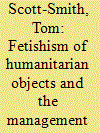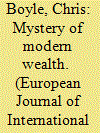| Srl | Item |
| 1 |
ID:
123529


|
|
|
|
|
| Publication |
2013.
|
| Summary/Abstract |
This paper examines two common objects in humanitarian assistance: a therapeutic food called Plumpy'nut, and a tape for measuring malnutrition known as the muac band. It argues that humanitarian relief has become a standardised package reliant on such objects, which receive excessive commitment from aid workers and are ascribed with almost magical powers. Drawing on the Marxist notion of commodity fetishism, the paper proposes a three-part model for examining this phenomenon, in which humanitarian objects are bound up in processes of concealment, transformation and mystification. First, these objects are perceived as rootless, recent discoveries, allowing the complex history and ambivalent results of technology to be concealed. Second, they facilitate a single-minded attention to efficiency and aggregate survival, which transforms the way humanitarian action is understood. Third, these objects are imbued with a mystical and autonomous spirit, redefined as irreplaceable elements of aid. This 'fetishism of humanitarian objects', the paper concludes, prevents a more flexible and people-centred approach to relief.
|
|
|
|
|
|
|
|
|
|
|
|
|
|
|
|
| 2 |
ID:
083741


|
|
|
|
|
| Publication |
2008.
|
| Summary/Abstract |
Taking its cue from Jacob Viner's classic essay `Power versus Plenty', this article explores the social foundations of one of International Relations' basic analytic categories: `wealth'. An examination of changing notions of economic value in the early-modern period suggests that Viner's assessment of the unenlightened attitudes of mercantilist statesmen needs revision. The rise of a liberal world order presupposes not just a clearer understanding of the nature of value, and how best to obtain it, but a fundamental transformation in the character of value itself - from an attribute of metallic money alone, to an abstract economic property of all human labour. In accounting for this shift we reveal an underlying structure of social relations whose development lies at the root of both our modern notion of value and of the liberal international economy itself.
|
|
|
|
|
|
|
|
|
|
|
|
|
|
|
|